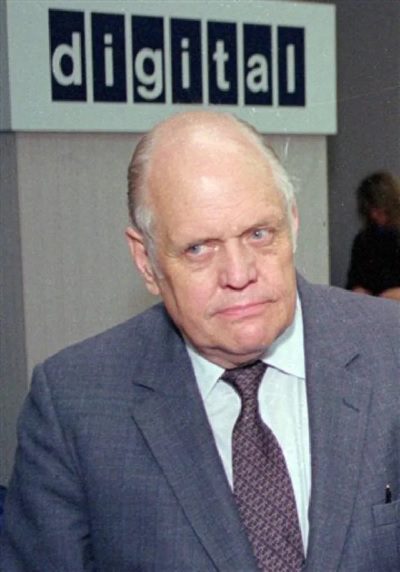Ken Olsen, the inventor of the non-commissioned salespeople, was an American engineer who co-founded Digital Equipment Corporation (DEC) in 1957. He was President until he was forced to resign in 1992 after the company had gone into precipitous decline. But before that, DEC was a major hardware maker for three decades, reaching $14B in revenue at its peak, most likely the equivalent of at least $500B today, given the much smaller number of tech players in the 80s than today. DEC was the second-largest tech company of its time.
Ken Olsen had a view about the sales function that many engineers shared but rarely kept that vision when they became the top guy at the company (or never became the top guy because of that vision). Read his interview, originally posted here, and decide if this was one of the key reasons the company died despite all the innovations.
Interviewer: Could we talk about another interesting aspect of Digital—your decision to use non-commissioned salespeople?
Ken Olsen: You could say that what is commonly believed is almost always wrong. No one on the board of directors ever understood the idea behind noncommissioned salespeople. They didn’t understand anything.
It all depends on how you think of a salesperson. If you think he’s a professional and you want him to act like a professional, you treat him like a professional: “Your job is to sell. Your satisfaction comes from doing your professional job.” The problem was that management couldn’t leave the non-commissioned plan alone and snuck in a commission plan. It took a very thick manual to explain the plan. In effect, the message to the salesman was, “Memorize the manual and focus more on knowing the rules than on the products you’re selling.” You can see the harm in that. Management just couldn’t leave their cotton-picking hands off the sales plan. Like the income tax system, it got more and more complicated.
People always approached me and said, “I’ve got a product that doesn’t sell. Let’s temporarily have a commission plan for it.” I said no. “You’ll always make dogs for products. By putting a commission on the dogs, you end up selling the dogs and not the products customers really want.”
Everything gets messed up by paying commissions on the dogs. The same thing is true with piecework. I have a friend who was a wood-cutter. He made a lot of money. I called him and said, “I’m giving a speech on commission plans and piecework. Piecework pay must really work in the woods because you simply get paid for the amount of wood you cut.” He exploded. He told me that after getting paid for piecework, loggers at one company were running in the woods and driving machines faster in order to get paid more. Finally, the logging company paying piece rates had to fire the whole crew because the accident rate was so high the company couldn’t pay for the insurance.
People have this naïve, stupid idea that everybody is motivated by money—it’s common knowledge. When I left Digital, the company, of course, went whole-hog into commissions. They never figured it out. The sales manual, I understand, was real thick. It’s too complicated.
The common belief about commission plans is, “Boy, what a chance we have to manipulate people!” Trying to manipulate people is the wrong attitude. The results are just terrible.
So when you created a noncommissioned plan, your objective was to motivate people by…
—Just saying, “You’re a professional, and we expect you to act like a professional.”
And the means for instilling this motivation?
No, no, no. You’re talking like a manipulator again.
But you did want people to be proud of their professional work.
Yes.
What do you think motivates employees?
There are always a certain number of people who are motivated by power, jealousy, and vindictiveness. In my last years at Digital I didn’t do a good job of getting rid of that influence. Most people really want to be proud of their work. And if you encourage pride in one’s work, you will end up with people who are proud of their work. When you go to work every day, it’s terribly important to get the satisfaction that you’re doing something useful or successful. In general, people are more satisfied if they’re expected to be honest than if they’re expected to be dishonest—you end up with a different class of people. Most people want to work for positive reasons, not for some arbitrary commission plan.
Fact: DEC ended up failing miserably. You be the judge, why!
My two cents on this? It’s easy to sell when you have the most advanced and innovative technology. Sellers don’t sell; they get bought. That’s what was happening to DEC, thanks to the products. VAX computers had no competitors on the market. So they could be twice as expensive and would still be worth buying. But when the market changed, and workstations, like Unix workstations and later PCs, grew strong enough to compete with mini computers, DEC needed a robust sales force to fight. DEC’s sales force was all but strong. The company failed fast, I mean super fast.


Comments are closed.